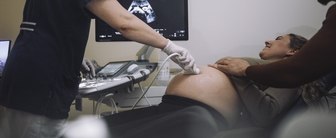For many years, living a healthier life has been a top New Year's resolution for Americans. But do Americans view personal and societal health issues as moral concerns? As a part of a broader project on morality, YouGov surveyed Americans on their perspectives regarding the morality of maintaining good health and receiving health care.
When it comes to people’s personal health, half of Americans (50%) say that people who take care of their own health are about as moral as Americans who do not take care of their health. However, 19% of Americans say that people who take care of their health are more moral than people who do not; only 5% say they are less moral. Adults under 45 are more likely than older adults to say that people who take care of their own health are more moral than those who do not (26% vs. 14%). Opinions on the morality of personal health also vary by education: While 27% of Americans with a college degree say that people who take care of their health are more moral than those who do not, only 15% of Americans without a college degree agree.
Beyond the morality of personal health choices, more Americans say that essential health care should be free for all than say that people should have to pay for it (53% vs. 31%). Two-thirds (67%) of Democrats, 51% of Independents, and 38% of Republicans say that essential health care should be free for all. Women (56%) are slightly more likely than men (49%) to say that essential health care should be free. Black Americans (64%) are more likely than Hispanic Americans (55%) and white Americans (51%) to agree with this stance.
However, as the U.S. does not have universal health care, some Americans think others' costs for health care should depend on their smoking, which has been shown repeatedly to negatively affect health. Americans are divided on whether people who smoke should have to pay more for health insurance than people who do not: 39% say yes, 41% say they should pay the same, and 7% say they should pay less. Americans 45 and older are more likely than younger adults to say that smokers should pay more for health insurance than non-smokers (49% vs. 28%); 14% of younger adults say smokers should pay less, compared to just 1% of adults 45 and older. Independents (32%) are less likely than both Democrats (41%) and Republicans (46%) to favor higher insurance rates for smokers. The share of people who think smokers should pay less for health insurance generally is higher for people with more educational attainments: 11% of college graduates say smokers should pay less for health insurance, while only 4% of those without a college degree say the same.
While many Americans support higher insurance rates for smokers, the vast majority say someone who can't afford to pay at all should get treatment. About three-quarters of Americans (78%) say that a person in need of urgent care should be treated even if they do not have health insurance and they cannot afford the treatment, with Americans 45 and older (91%) more likely to take this stance than younger adults (62%). Political affiliation isn't associated with different views on treatment for people who can't afford it: 83% of Republicans, 78% of Democrats, and 75% of Independents say that a person should be treated even if they cannot afford it and don't have health insurance.
Although many Americans associate health with morality, by 47% to 40% Americans are more likely to say that doctors do not have a responsibility to lead a life of example when it comes to health, as long as they carry out their job to the best of their ability. Opinions on this matter do not differ significantly by age, political party, education, or race.
What moral responsibility do doctors have to their jobs, even amid a labor dispute? Americans’ opinion of doctors going on strike depends on whether striking doctors would still perform emergency procedures. By a narrow margin of 40% to 35%, Americans say that it could be morally justifiable for doctors to go on strike, provided that they still perform emergency procedures. However, only 18% said it would ever be morally justifiable for doctors to go on strike without providing emergency care, while 50% said it would not. Democrats (46%) are more likely than Independents (29%) and Republicans (30%) to say that it can be morally acceptable for doctors to go on strike, provided they still perform emergency procedures. The share of Americans who agree with this stance varies by level of education: While 28% of Americans without a college degree say it can be morally justifiable, about half (48%) of those with a college degree say the same.
In the case where doctors would not be providing emergency procedures while on strike, the share of Americans who say it would be morally justifiable is lower at older ages: one-quarter (25%) of adults under 30, 31% of those between 30 and 44, 11% of those between 45 and 64, and 6% of Americans 65 and older say it can be morally justifiable for doctors to go on strike and not provide emergency care. Democrats (24%) are more likely than Republicans (18%) and Independents (11%) to say going on strike is morally acceptable for doctors even if they do not perform emergency procedures. Americans with college degrees are more likely to say that the strike than Americans who do not have college degrees to say it would be morally acceptable compared (29% vs. 12%).
Related:
- Do Americans think being moral is the same thing as following the law?
- Which actions — and people — do Americans consider immoral?
- How do Americans think about morality in the U.S. today?
- The moral state of American politics
See the results for this YouGov poll
Methodology: This article includes data from two online polls conducted November 17 - 21 and November 18 - 21, 2022 — each among 1,000 U.S. adult citizens. The 2,000 respondents were selected from YouGov’s opt-in panel using sample matching. A random sample (stratified by gender, age, race, education, geographic region, and voter registration) was selected from the 2019 American Community Survey. The sample was weighted according to gender, age, race, education, 2020 election turnout and presidential vote, baseline party identification, and current voter registration status. Demographic weighting targets come from the 2019 American Community Survey. Baseline party identification is the respondent’s most recent answer given prior to March 15, 2022, and is weighted to the estimated distribution at that time (33% Democratic, 28% Republican). The margin of error for the overall sample is approximately 2%.
Image: Unsplash (Sasun Bughdaryan)











